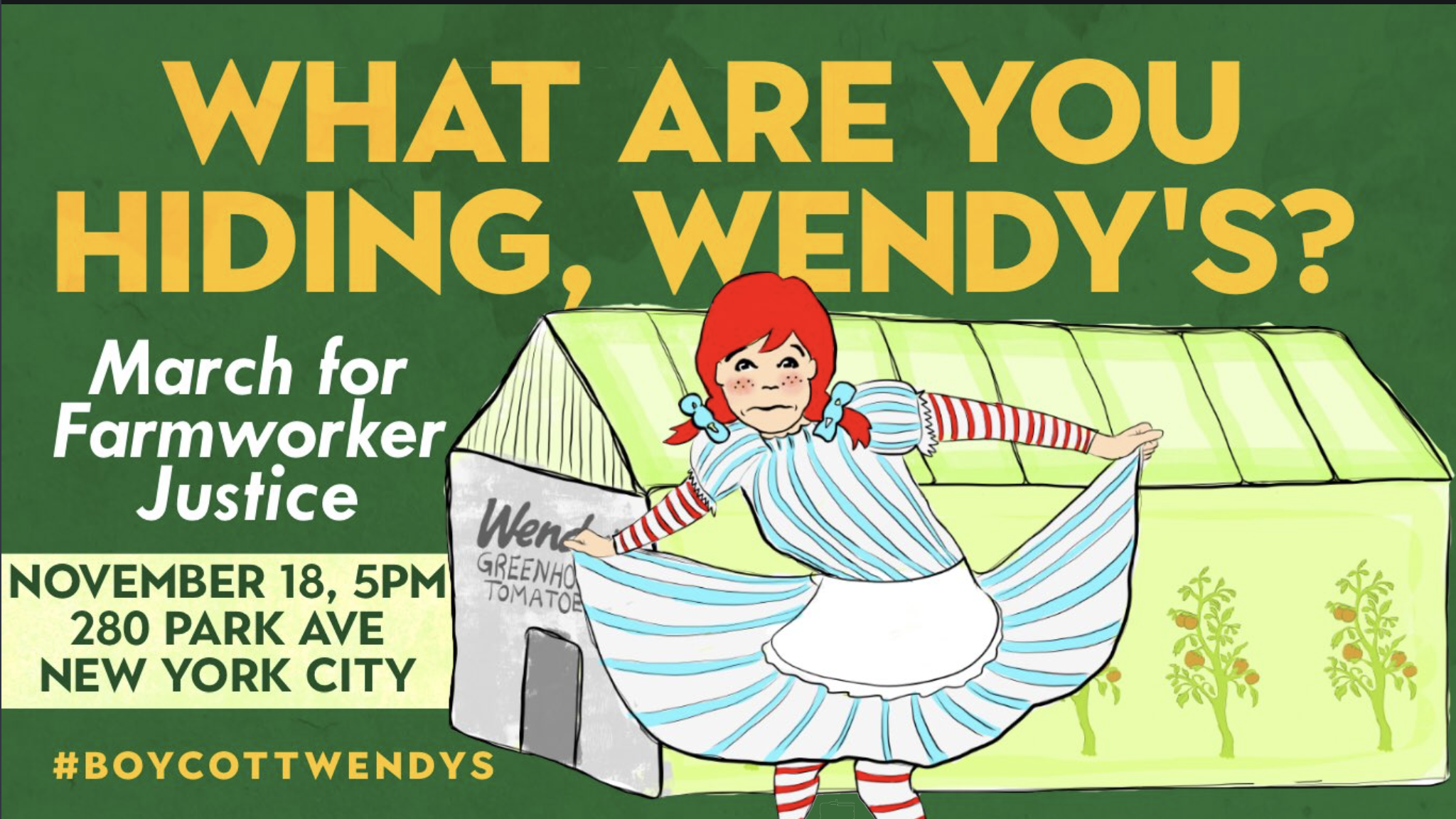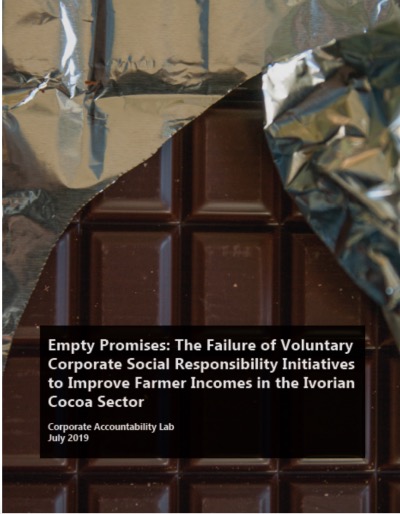
Corporate Accountability Lab: @Hersheys Stop hiding behind misleading labels like @RnfrstAlliance, while profiting off of the backs of children and refusing to pay farmers a fair price. #LivingWages #FairPay #LaborRightsAreHumanRights
Imagine you live in a community where crime, including violent crime, is commonplace. Armed robbery, kidnapping, sexual assault, all occur on a regular basis, yet there is no actual police force on the ground to protect you, or even a 911 line to report crime in real-time. The only way to bring a crime to the authorities’ attention is through a once-a-year visit to the community by a small team of investigators who may or may not speak your language. And on these annual visits, the investigative team only manages to speak to a handful of people, making the chances of your complaint being heard exceedingly small, and the probability of justice being done smaller still.
Would you feel safe? Would you consider the protections adequate?
All the while, the authorities in this imaginary community claim that crime is not a problem, and even run ads promoting the city’s spotless crime record.
Would you be frustrated?
Workers on West African cocoa plantations have faced crime on their jobs, including violent crime, for generations. From child labor and widespread wage theft to modern-day slavery, the labor abuses exposed in the cocoa harvest on the plantations that supply the worlds’ giant chocolate companies are as well-documented as they are egregious. The seminal documentary “The Dark Side of Chocolate,” CNN’s expose “Chocolate’s Child Slaves,” and the book “Bitter Chocolate: Investigating the Dark Side of the World’s Most Seductive Sweet,” comprise just the tip of the iceberg of hard-hitting journalism cataloging the crimes against cocoa workers and the corporations that profit from their labor over the past two decades.
The uncovering of these widespread abuses in the cocoa industry in the 1980s and 1990s caught the chocolate industry unprepared for the intense wave of criticism, and the resultant consumer backlash, that followed. In response, many of the leading chocolate corporations turned to the well-known leaders in the burgeoning field of Corporate Social Responsibility, certification programs including Rainforest Alliance and Fair Trade, to audit plantations in their supply chain. The logos of these trusted certifiers began to appear on chocolate products on retailers’ shelves across the US and Europe, reassuring consumers that the workers who harvested their cocoa enjoyed strong and effective protections.
From the point of view of the chocolate corporations, their CSR partners accomplished their mission. Consumer concerns about labor abuse were allayed.
But from the point of view of the workers themselves, little or nothing had changed. The abuse never stopped.
 In its July 2019, report, “Empty Promises: The Failure of Voluntary Corporate Social Responsibility Initiatives to Improve Farmer Incomes in the Ivorian Cocoa Sector,” the Corporate Accountability Lab staff “interviewed farmers, tribal leaders in cocoa-growing villages, cocoa cooperatives, and local and international NGOs to assess the impact of Corporate Social Responsibility (CSR) efforts in the industry, and to identify the root causes of the serious and ongoing problems in the cocoa sector: child labor, trafficking, and deforestation.” Their findings were unequivocal:
In its July 2019, report, “Empty Promises: The Failure of Voluntary Corporate Social Responsibility Initiatives to Improve Farmer Incomes in the Ivorian Cocoa Sector,” the Corporate Accountability Lab staff “interviewed farmers, tribal leaders in cocoa-growing villages, cocoa cooperatives, and local and international NGOs to assess the impact of Corporate Social Responsibility (CSR) efforts in the industry, and to identify the root causes of the serious and ongoing problems in the cocoa sector: child labor, trafficking, and deforestation.” Their findings were unequivocal:
What we saw was appalling: CSR efforts have had a nearly imperceptible impact on the lives of cocoa farmers and their communities. The sustainability claims of major chocolate brands and agribusiness companies not only mislead consumers, they obfuscate a system that relies on child labor, forced labor, and debt peonage to survive.
While CAL’s principal conclusions identified the root cause of workers’ poverty and abuse in the unsustainably low price paid by chocolate companies for Ivorian cocoa, two of their four highlighted findings pointed blame at the certification schemes themselves:
… 2. Reliance on “CSR” over responsible business conduct: Companies rarely mention their business and human rights obligations, and instead have relied on ineffective certification schemes while failing to comply with their voluntary commitments, despite nearly 20 years of CSR activity in the sector;…
4. Lack of involvement of farmers, farmer groups, and civil society in the ongoing conversations and initiatives around the issues in the sector: Farmers lack access to information and participation, local groups working with farmers and communities have limited support, and international groups either have insufficient access to local partners or take an engagement approach that allows companies to whitewash their actions. (read more)
The frustration coursing through the Empty Promises report was palpable and entirely justifiable. Like the residents of the thought experiment at the top of this post, workers on the farms investigated in the CAL study suffered extreme abuse on a regular basis with no way to safely inform the auditing organizations of those abuses, much less for the auditors to investigate and resolve their complaints. In stark contrast to the Fair Food Program’s in-depth on-site audits (where 50% of workers present are interviewed) and its independent, third-party, 24/7 worker complaint hotline (which is accessed by workers daily and has resolved thousands of complaints through thorough investigations), Rainforest Alliance directs workers with a complaint about a certified farm to first complain to that farm directly and is currently permitting all its audits to be done remotely from July 1, 2021 to June 30, 2022.
Due to this lack of effective monitoring and enforcement mechanisms, and the absence of any kind of meaningful participation by workers in defense of their own rights, the certifying organizations were left with no functional way to know what was happening on the farms at any given moment (other than the fact that the industry as a whole is replete with abuse). Yet, despite their extremely limited visibility into conditions on the farms, and their knowledge of the sector’s generally abusive conditions, the certification schemes were willingly used by the chocolate companies to assure consumers that workers’ human rights were being closely monitored and strictly protected in their cocoa supply chains.
Now, two years later, CAL has taken its efforts to end labor abuses in the chocolate industry to the next level. Here is the press release announcing their groundbreaking lawsuit earlier this month, in its entirety:
Corporate Accountability Lab (CAL) is excited to announce that on October 27, 2021 we filed suit against Hershey and the certification scheme Rainforest Alliance in a consumer protection case in Washington, D.C. Superior Court. CAL, as the plaintiff in the case, is suing the defendants — Hershey and Rainforest Alliance — for false and deceptive marketing representations on certain Hershey chocolate products. We are bringing suit under the Washington, D.C. Consumer Protection Procedures Act (“CPPA”), a consumer protection statute that allows public interest organizations like CAL to sue on behalf of the general public.
The West African cocoa industry continues to suffer from endemic issues of child labor, forced child labor, and farmer poverty — a result of low prices that wealthy multinational companies pay for cocoa. Meanwhile, social auditing and certification schemes like Rainforest Alliance, which purport to help farmers produce cocoa “sustainably,” are failing them. Over the past year, CAL’s investigators have documented instances of hazardous child labor on Rainforest Alliance certified farms in different parts of Cote d’Ivoire and spoken with farmers who explain that they don’t earn enough from cocoa farming to support their families. As one father explained, “They tell us that children are not supposed to work but they are the ones who help me feed the family. Children work in the plantations because the cooperatives and companies treat us so badly that we need to make children work on the plantations.”
Although a consumer protection action may not be a traditional form of human rights litigation, we think it’s vital to shed light on issues of child labor and exploitative working conditions in the West African cocoa industry using every available tool. Hershey benefits financially from cheap cocoa supplies, while Rainforest Alliance distracts from the real issues in Hershey’s supply chain by putting their seal on products. Not only are consumers who want to buy ethically produced cocoa misled by Rainforest Alliance’s seal, these labels also allow companies to avoid liability for their role in perpetuating human rights violations in cocoa supply chains.
To learn more about the case, you can read the complaint here and a press release here. You can also read this blog describing incidences of hazardous child labor on Rainforest Alliance certified cocoa farms in Cote d’Ivoire here.
We will be following developments in this suit closely in the months ahead. As we ourselves have argued for years, certifying organizations that rely on little more than yearly audits to monitor conditions in the workplace do little or nothing to protect workers or prevent longstanding abuse. They are “not fit for purpose,” in the words of the MSI Integrity report by that same name, if their purported purpose is to protect workers’ fundamental human rights. Yet those same auditors remain popular with the corporations that engage them to monitor conditions in their supply chains, due in no small part to the trust their familiar brands and logos have enjoyed with consumers for years. They are — in the eyes of the workers whose rights they claim, but fail, to protect — public relations agencies in human rights clothes.
This suit will test the proposition that consumers can legally hold the retailers where they shop accountable for the claims those corporations make about social responsibility and working conditions in their supply chains. But not only that. It seeks to extend that proposition to the weak and discredited social auditors and certification schemes that collaborate with corporations in making those claims. It is an arrow aimed at the heart of the traditional Corporate Social Responsibility model, the model that the Fair Food Program and other Worker-driven Social Responsibility programs were designed to replace. We will be watching.

